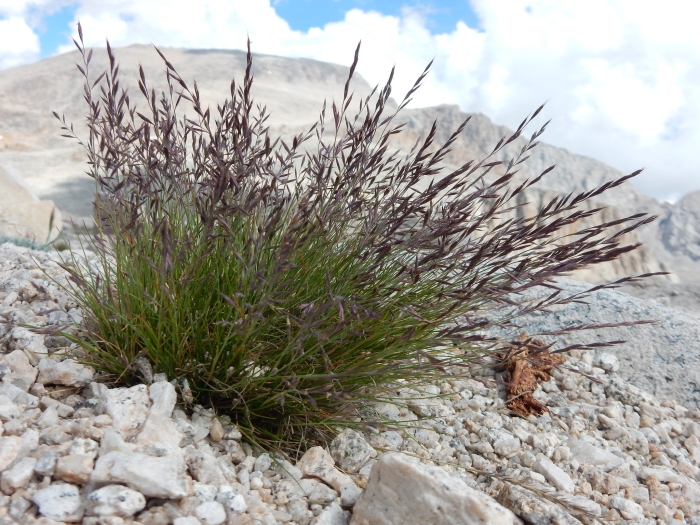Idaho Fescue
(Festuca idahoensis)
Idaho Fescue (Festuca idahoensis)
/
/

Matt Lavin
CC BY-SA 2.0
Image By:
Matt Lavin
Recorded By:
Copyright:
CC BY-SA 2.0
Copyright Notice:
Photo by: Matt Lavin | License Type: CC BY-SA 2.0 | License URL: https://creativecommons.org/licenses/by/2.0/ | Uploader: Matt Lavin | Publisher: Flickr |



























Estimated Native Range
Summary
Festuca idahoensis, commonly known as Idaho Fescue, is an evergreen perennial grass native to a variety of habitats including dry open woodlands, grasslands, and alpine areas in the Western USA and Canada. It typically grows to a height of 30 to 80 centimeters and forms dense clumps. The foliage consists of stiff, short, blue-green leaves that roll inward and are primarily located near the base, giving the plant a tufted appearance. The inflorescence features hairy spikelets that produce large awned fruits, and the plant blooms from late spring to early summer. Idaho Fescue’s deep, thick root system, which forms symbiotic relationships with mycorrhizae, allows it to thrive in less fertile soils and helps stabilize the soil.
Idaho Fescue is valued for its drought tolerance and low maintenance requirements, making it an excellent choice for xeriscaping and naturalized areas. It is also used in restoration projects due to its soil stabilization properties. This grass is suitable for full sun to part shade conditions and is adaptable to a range of soil types, from well-drained to clay, as long as they are not waterlogged. While it is generally pest and disease-free, it can suffer from rust in wet conditions. Idaho Fescue is not known for aggressive roots or invasiveness.CC BY-SA 4.0
Idaho Fescue is valued for its drought tolerance and low maintenance requirements, making it an excellent choice for xeriscaping and naturalized areas. It is also used in restoration projects due to its soil stabilization properties. This grass is suitable for full sun to part shade conditions and is adaptable to a range of soil types, from well-drained to clay, as long as they are not waterlogged. While it is generally pest and disease-free, it can suffer from rust in wet conditions. Idaho Fescue is not known for aggressive roots or invasiveness.CC BY-SA 4.0
Plant Description
- Plant Type: Grass
- Height: 0.5-1 feet
- Width: 3-5 feet
- Growth Rate: Moderate
- Flower Color: N/A
- Flowering Season: Summer
- Leaf Retention: Evergreen
Growth Requirements
- Sun: Full Sun
- Water: Low
- Drainage: Fast, Medium, Slow
Common Uses
Bird Garden, Border Plant, Butterfly Garden, Deer Resistant, Drought Tolerant, Erosion Control, Fire Resistant, Groundcover, Low Maintenance, Potted Plant, Rabbit Resistant, Rock Garden, Street Planting
Natural Habitat
Dry open woodlands, grasslands, and alpine areas
Other Names
Common Names: Blue Bunchgrass, Bluebunch Fescue, Fétuque D’Idaho
Scientific Names: , Festuca idahoensis, Festuca idahoensis var. idahoensis, Festuca idahoensis var. oregana, Festuca ingrata var. ingrata,
GBIF Accepted Name: Festuca idahoensis Elmer